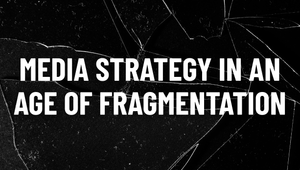
How Do You Build an Effectiveness Culture That Supports Creativity?

On October 10th 2023, the IPA’s EffWorks Global (a hybrid conference) will provide unparalleled opportunities for brands and agencies to arm themselves with the knowledge needed to navigate marketing effectiveness, and improve business performance. In the weeks leading up to the event, LBB is discussing the most crucial themes in effectiveness today with some of the leading thinkers and leaders in the conversation.
What does it take to build a cohesive marketing effectiveness culture? That was the question that the IPA asked in its 2022 Marketing Effectiveness Roadmap, laying out a framework for how to make best practice everyday practice, supported by ISBA and Marketing Week.
Nick Milne was the author of that report. Founder and director of Go Ignite Consulting, a marketing-effectiveness accelerator, his definition of ‘effectiveness culture’ is well-rehearsed by now: “The creation of business value from marketing activities.” He breaks that down a bit further: “It's made easier by having a strong and clear focus on what effectiveness is, a good people agenda, backed up with data, tools and measurement.”
Brands and agencies that achieve effectiveness have shown that they have all of those components working together. “You're not just looking at the individual parts, but looking at how the organisation aligns around the value they’re trying to create, making it as easy as possible to generate that value and then proving that it's actually worked – that marketing is doing what it's been asked to do,” says Nick.
That culture goes beyond most brands’ previous level of understanding of effectiveness into something much more all-encompassing. For Nick, that’s a big step forward for many. “I think that's the real shift from what effectiveness is,” he says. In his previous roles as a brand marketer, when colleagues spoke about effectiveness, it was only a small part of the larger picture. “It was just talking about an analytics project, an MMM [marketing mix modelling] piece, creating a bit of evidence,” he says. “That would go nowhere, because you hadn't thought about what the organisation is trying to achieve. If you're bringing a new bank of evidence to change how people are thinking, and if you haven't taken people on that journey to understand why you're doing it, you're not going to shift hearts and minds. It's much more than that when you're talking about culture.”
Chief marketing officer at NatWest Group, Margaret Jobling has been working with the IPA to champion 30 agencies with the IPA Effectiveness Accreditation, for which she chaired the panel of judges. So she’s recently seen what effectiveness culture in action looks like. “For me, it's when you've got belief in the value creation that marketing brings,” she says. It’s a journey that culminates, as she sees it, when the whole business understands that investment in marketing is driving real commercial value.
That’s not where a lot of brands and agencies are yet, she admits. “Thanks to the work the IPA has done, awareness is really high. People know they need to be able to articulate the value they bring. But I still see there is a commerciality gap in marketing. We don't think like business owners.
“There's a lot of work done for the sake of work, a lot of vanity metrics,” she continues. “We get excited that we've got three billion hits on TikTok - who gives a damn? In the nicest possible way, what's it doing for you?”
Nick has seen how far many brands and agencies are from having a strong effectiveness culture. “A lot of marketers become very task orientated and head down. Not looking out and across organisations, asking the questions of why they're doing things outside of marketing and building relationships with finance,” he says.
In his role at Go Ignite he was recently telling a brand how one of their markets is performing and they didn't want to know anything about pricing and distribution. He was baffled. “How can you look at your promotion without the view of how all your other levers are working together? That's part of the disconnect. People aren't looking up and out. They're becoming very focused on what they can deliver. That's the biggest challenge we're seeing, getting people to change their ways of working and thinking about the broader picture, feeling empowered about what they should do and understanding the impact.”
For Margaret at NatWest Group, the key to marketing gaining credibility across a brand is the balance of magic driven by facts. “Data and commerciality is at the heart of what we do, and it's as important as creativity,” she says. “When you've got one without the other, you're the colouring-in department. And if you're just a numbers person, you might as well work in finance. It's the ability of marketeers to be able to talk to what many people see as an intangible. There's an element of art but there's also a big element of science.”
There’s a danger of diving too deep into the numerical soup that today’s data-rich environment serves up. An effectiveness culture needs to hold onto the truth that creativity has commercial power. “Ironically, the thing I think we've lost most as an industry is creativity,” says Margaret. “There are so many things you can measure that we're seduced by the numbers. Actually, great creativity drives commercial outcomes. I've got many theories on why, but I do think it's an industry we don't value creativity in the way that we would have historically. And we don't create conditions for it to thrive, therefore diminishing returns of chasing effectiveness, coming at it through measurement versus at the start of the process being about what you're trying to achieve and how you get there.”
Margaret peels back the layers of an effectiveness culture. First, business objectives need to be the starting point of any marketing endeavour.
Next, answer the question: “How do marketers build commercial plans that will deliver that?”
To answer that, marketers need to understand the media landscape, tools and measurement, and have econometrics models.
Setting targets is the next crucial layer. “Because actually one of the biggest challenges is working out what you are actually measuring and what impact you are trying to drive,” says Margaret.
Then comes the importance of buy-in from the financial side of the business. “If that money's being spent on that thing to drive that outcome – where, when and how do you expect it to show up in the P&L? You need to point to that measurement,” she adds.
Even once marketing departments are acting with commercial goals at the centre, there’s the battle for the rest of a business to trust in the value of marketing. “I've seen in many businesses, at the end of the year P&L is tight, they ask you to take £5 million out of marketing. And they don't believe it's going to make a jot of difference to the commercial outcome,” she says.
She’d like to see that dynamic flipped on its head by weaving an effectiveness culture throughout businesses. “I know I've cracked it when the business believes the marketeer that £10 million invested is going to deliver a £15 million return and you can see it in the P&L, you can track and trace it through and people celebrate that.”
For that to happen, every part of a business needs to believe in the effectiveness of marketing. And for that to be the case, the way marketers speak to the rest of their business has to be focused around effectiveness. “It's a business value creation, not a marketing value creation,” says Margaret. “And the most successful marketers are those who can articulate the value they bring to the business. And therefore you have to talk like a businessperson who has a functional route in marketing, not as a marketer who generates lovely advertising campaigns. Otherwise you're not credible.”
The right mentality needs to be wrapped around all of that to make it work. “It needs a culture of learning and experimentation because it's art and science, we don't have all the answers. You've got new platforms popping up left, right and centre, your audiences shift, customer behaviour changes. You need to be thinking that this is an evolution.”
“You need to have marketeers who understand how the system works,” she says. “If they don't understand that, how do you test and learn your way through? You need tools, measurement and a culture which is aligned with your agency's. You should be celebrating and talking about how a campaign performed, looking at trading numbers. Are you on your numbers? Are you off the numbers? Why? And then retrospectively how you build that loop to the next cycle of forward planning.”
None of this can be done in a silo in a marketing department or agency walled garden. The financial director or the CEO or head of product needs to be able to understand exactly what marketing is doing. “You need complete visibility of what your plans are across the organisation,” says Nick. “So there's no feeling that marketing is taking money and doing things and then not showcasing results that come from that. Having that openness builds relationships. It gives people understanding of what you're doing, the value that it should be generating, and then coming back and saying whether it's done that.”
Margaret has seen marketing departments try to spin failures as successes with bogus metrics before and knows how that dilutes a culture of effectiveness. “That undermines trust,” she says. “I think there needs to be a level of maturity and honesty: 'We tried some stuff. We had some clear assumptions. This is what we've learned, and it didn't flow through as we'd expect it to.' That's maturity in an effectiveness conversation. And when you're off your numbers, you can talk about why, what were the assumptions and what's changed. When it's in your culture, it's just how you do business.”
Weaving an effectiveness culture through a whole organisation is bound to be a challenge, but experts like Nick and Margaret have witnessed the commercial value of making these changes. They’ve studied the businesses that have done it, identified what it takes and added it to the IPA’s bank of knowledge. All you have to do is follow their advice.
To learn more about building your effectiveness culture and how this can impact your work, relationships and new business, from both successfully accredited agencies and members of the judging panel, get your tickets for IPA EffWorks Global 2023 – a hybrid conference where creatives, strategists, brand marketing and agency leaders alike can get involved in effectiveness. Nick will be one of many expert speakers sharing knowledge on what effectiveness in marketing means today.













